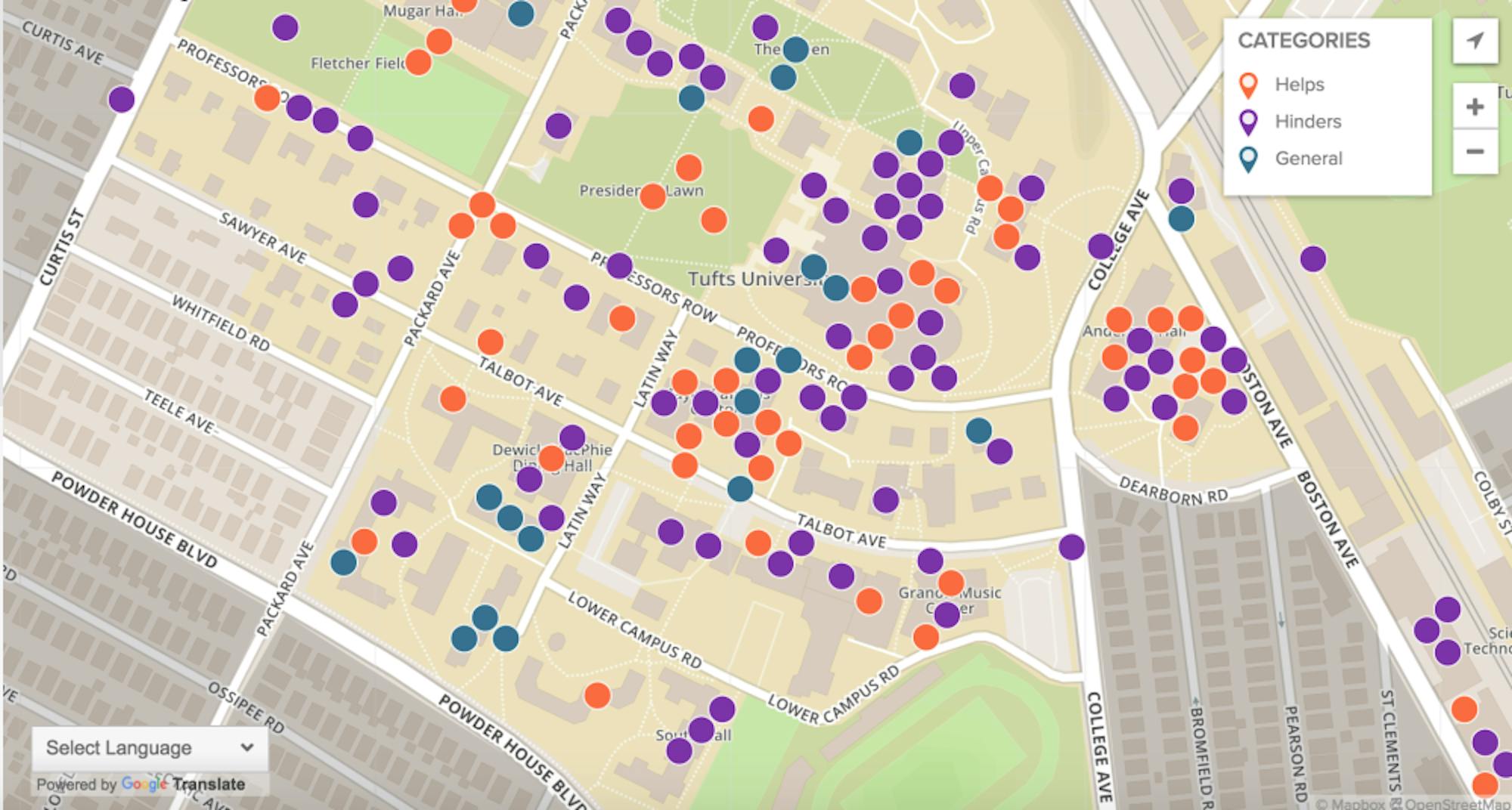Tufts' campus has been flooded with advertisements this semester, asking for student input on the physical space around campus.
"Real talk... How should this space be used--and what features should it have?" the poster outside Curtis Hall, home to the former Brown and Brew Coffee House, reads.
This is the work of Brown and Blueprint, a Tufts Community Union (TCU) Senate initiative started last fall to elicit feedback on campus space. The initiative utilizes the digital community engagement platform coUrbanize where students can submit comments about specific physical spaces on a virtual map or via text message. Students can alsorequest a one-on-one meeting with a member of the TCU Senate Administration and Policy Committee.
“Brown and Blueprint was an initiative in response to the Student Life Review Committee (SLRC) report [which discovered that] an underlying pervasive issue on campus was the issue of spatial inequity,” TCU President and senior Benya Kraus, who also sat on the SLRC, told the Daily in an interview.
According to Kraus, Brown and Blueprint, including the website and the posters, has spent about $2,000 and is funded by Campus Planning, the Office for Campus Life and the Office of the President, but not the Student Activities Fund.
Just two years ago, a similar student survey -- albeit focused on campus housing -- was organized by a working group comprised of C
“The focus is housing, but we want to understand how people are using other [spaces],” former Space Management Planner Heidi Sokol was quoted as saying in a 2016 Daily article. “The survey will seek to find out if there are any ancillary spaces that make sense to be part of … the residential hub.” Sokol is now senior campus planner.
According to Director of Campus Planning Lois Stanley, the 2016 campus housing survey -- facilitated by architecture and planning firm Sasaki Associates and driven primarily by university staff -- differs from Brown and Blueprint in scope and student involvement.
“The 2016 Sasaki housing study was focused on residential facilities. The feedback gathered through a survey and focus groups informed Sasaki’s recommendations for a multi-year undergraduate housing program. Brown and Blueprint, which is a student initiative, addresses the entire campus,” Stanley told the Daily in an email.
Brown and Blueprint is focused on the physical spaces where students learn, meet people and develop a sense of community at Tufts. Kraus said that the initiative can identify campus spaces that have been neglected and have caused some communities to feel undervalued.
“Your access to social capital and sense of belonging on this campus was both caused by and reinforced by your access to space,” Kraus said.
Kraus cited the specific example of spatial inequity with the Africana Center and House in Capen House, which had been identified by students over a year ago as being in dire need of renovation and cleaning.
“Capen House had a sink unsuitable for washing and cooking," Kraus said. "There were also concerns about there being asbestos in the basement.”
Africana Community Senator Fatima Ajose, a senior, responded to these concerns by getting the university administration to refurbish the Capen House kitchen with new cabinets, a new sink and new counter-tops, while the asbestos was cleared out over summer 2017.
Kraus described that moving forward, the initiative can help to identify communities that need improved physical spaces.
“Where is community being built, and where is it not being built?” she said of Brown and Blueprint's overarching questions.
Sophomore Paul Henjes was one of the students who commented online to express concern with the state of Eaton Hall.
“As a sociology major, most of my time is spent in Eaton [through] office hours and classes. It’s definitely an important building for me ... In Eaton, there is no all-gender bathroom, and many of the programs in Eaton tend to be very LGBT-dominated," he said. "I think it would be very important and helpful to have an all-gender bathroom."
Henjes added that the issues with Eaton Hall point to a larger disparity between facilities for liberal arts and engineering departments.
“I think a lot of liberal arts students don’t feel like they’re valued on this campus as much as engineering students are,” Henjes said.
Emma Phillips, a Class of 2019 senator and Senate Education Committee member, also voiced her personal concerns with Eaton Hall.
“I was in a classroom last year where the doorknob fell off, which makes it difficult to get in and out,” she said. “The air conditioning is non-existent in certain areas, so you’re always dying even if it’s 60 degrees outside. It would be nice if funds were allocated to make baseline improvements.”
Phillips believes that the scope of Brown and Blueprint's effort can reach beyond just classrooms.
“I feel like so many people are focused on the classroom when they see a project like this," she said. "The university can also serve to provide really good study spaces or social spaces."
Phillips added that the initiative can spark lots of general improvements across campus, without specifically favoring one area over another.
Henjes spoke in a similar vein, stressing the importance that all students feel that administrators are listening to their concerns.
“I think that students can learn that voices are being heard, and the administration is listening,” he said.
Kraus said that the Brown and Blueprint team plans to compile the comments received, and present a draft report that summarizes students' concerns about campus spaces at a town hall in mid-April.
“We’re going to be putting together a report that we’re going to hand to the administration with a set of recommendations addressing the issue of spatial inequity on campus," Kraus said.
Kraus added that the town hall will be the final opportunity for students to have their views be included in the initiative's findings.
TCU Senate's Brown and Blueprint initiative aims to compile student feedback on campus spaces

The interactive map on the Tufts Brown and Blueprint Initiative website is pictured.





